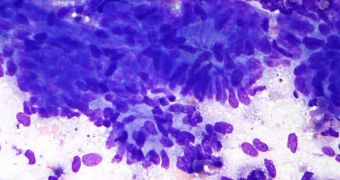Numerous cancer types are known to have an influence on human chromosomes, deleting certain portions in order to be able to infect the body. Now, researchers have shown that some of these deleted sections contain clusters of tumor-suppressing genes.
Experts say that this has been suspected for quite some time, but that evidence to prove that this was indeed the case has been lacking. The new investigation looked at a copy-number alteration (CNA), a deletion that occurs on the short arm of chromosome 8 (8p).
The study was carried out on mouse models of human liver cancer. Researchers found that this specific CNA affected a series of genes that work together to counteract tumors as soon as they start evolving.
According to researchers at the Cold Spring Harbor Laboratory (CSHL) and Memorial Sloan-Kettering Cancer Center, this chromosomal deletion is seen in numerous types of epithelial cancer, such as that affecting the liver, lungs, the colon and the breast.
Eliminating the portion of 8p that protects the body from cancer allows tumors to develop unchallenged, therefore increasing their chances of survival. This is the first research that clearly demonstrates this link.
Details of the research effort were published in the May 7 issue of the esteemed journal Proceedings of the National Academy of Sciences (PNAS). The team was led by adjunct professor Scott W. Lowe, of both MSKCC and CSHL, and Michael Wigler, a professor at the Laboratory.
These results “raise the possibility that large-scale genomic lesions can act through their effects on an opportunistic collection of linked genes rather than through disruption of a single resident gene,” explains Wigler, who is widely considered to be a pioneer in cancer genetics.
“The fact that the genes in 8p can cooperate to suppress tumor formation implies that the concomitant loss of multiple genes may create unexpected vulnerabilities not easily revealed through the study of single genes,” Dr. Lowe adds.
By using a study technique called RNA interference, the team demonstrated that suppressing that specific region of 8p entirely helps promote the development of epithelial cancer tumors directly.
The new study was funded by the National Cancer Institute, a Cancer Target Discovery and Development consortium grant, and the Don Monti Memorial Research Foundation, the Department of the Army and the Breast Cancer Research Foundation.

 14 DAY TRIAL //
14 DAY TRIAL //